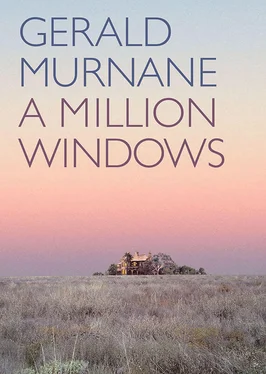If he had not mistrusted most of the men who met in the psychiatrist’s rooms, the chief character of the paragraphs hereabouts might have told them not that he had fainted away on the afternoon when he had spoken, or had tried to speak, for the first time to the young woman, hardly more than a girl, that he had looked at for two years but that he had never been able afterwards to recall anything of the occasion. He could readily recall during the remainder of his life the events leading up to the occasion. A small child had misbehaved in the compartment where he and the young woman travelled, and he had resolved to walk beside the young woman after they had left the train and to remark on the child’s antics. (One possible reason for his having waited for so long before speaking was his being unable to compose what would have been his opening remarks. He could never have merely greeted her or commented on the weather. He felt obliged to impress her from the very first with wit or humour.) He could recall afterwards, with some difficulty, his walking beside the young woman for a short distance before they took their separate ways homewards. And given that the young woman smiled at him when he entered the railway compartment on the following afternoon and that later he sat beside her when a seat had become available and that they talked together during the remainder of their journey, he could not doubt that he had communicated with her in some way or another during the few minutes that he could never afterwards recall. But whether he had said something witty or humorous or something banal or whether he had forced from his constricted throat only some or another friendly sound he would never know. He had certainly not fainted away as had the young man at the bus stop, but part of him had seemingly been numbed or had ceased to function.
As I reported in the previous paragraph, the young woman smiled at the young man as soon as he had stepped into her compartment on the afternoon following his attempt to speak to her, and he and she afterwards talked together. Had she not smiled, the young man would have assumed that no words from him had reached her on the previous afternoon and would merely have exchanged glances with her as before. He and she talked together at last, but the reader should not have in mind an image of two young persons chatting amicably and being at ease with one another. Perhaps the young woman was at ease and was amicably disposed towards the young man, but he was so ill at ease that he was afterwards unable to recall any more than two sentences spoken by the young woman from all that she had said to him during five or ten minutes of conversation on ten or, perhaps, fifteen weekday afternoons before the afternoon when they said goodbye to one another as usual while they walked down the ramp from the railway platform and then went their separate ways, even while he, the young man, had decided that he wanted no more to do with the young woman.
He, whether the reader perceives him as a character in a work of fiction being written by a personage in an upper room of a house of two or, perhaps, three storeys or as a fictional personage in a fictional setting not yet written about or merely as a character in this present work of fiction — he, however he may be perceived, was afterwards able to recall only two items from all that the young woman must surely have talked about during the two or three weeks when he and she had talked together at last. The first of the two items was her given name, which was Darlene. He surely told her during their first conversation that he had been unable to make out her given name on the afternoon when she had placed her exercise-book in his view, but he surely did not tell her that he had thought of her during the previous year as bearing the absurd name of Dathar . The second of the two items was a question that she asked him on the last afternoon when he and she spoke together, which question will be reported later in this work of fiction. Whatever else he had learned about the young woman he afterwards forgot, if he had even absorbed it during their time together, so that she seems to him today not a person that he once dealt with in the world where I sit writing these sentences but an inscrutable image-person whose appearance was derived from a certain dark-haired young woman, hardly more than a girl, that he saw often in a certain railway compartment: an image-person who might have been the chief character of a complicated daydream-world that the girl in the railway compartment could never have guessed at and who later became one of the chief characters in a certain published work of fiction in which she has a different name from the name of the young woman mentioned in the paragraphs and is reported as behaving somewhat differently.

At some time during every day, I like to walk in the grounds that I see often from my upstairs window but have hardly begun to explore. The reader should not suppose from my having used the word grounds just now what I supposed during the first years when I frequented this singular building. I used then to suppose that the extensive formal parks and lawns and lakes and flower-beds, together with the labyrinths of paths and walkways connecting them, would have ended abruptly in every direction, and at some considerable distance from the building, in a high fence or a wall or hedge, on the further side of which would have been the nearest paddocks of the mostly level grassy countryside that seems to surround building and grounds on all sides and seems to be crossed at long intervals by roads where sunlight flashes occasionally in the late afternoon from the windscreen of some or another car or truck too far away to be seen or heard, and seems to extend far beyond the low hills or the lines of trees on the horizon. In fact, I have never come across any such fence or wall or hedge. I mostly stroll without purpose in the grounds around this mansion, so to call it, but I have sometimes walked directly away from the building, wanting to learn how far I might travel while still feeling myself in sight of a few at least of the sumless windows behind me. Not only did I never come up against any seeming boundary, but I was never able to decide, at the furthest point of my excursion, whether the mostly level grass and the scattered trees around me were still part of the estate that included the tall house where I belonged for the time being or whether I had strayed across some unmarked border into the countryside that had always seemed, when I looked towards it from my upper window, beyond the reach of a person writing for hour after hour at a desk.
I mostly stroll without purpose, as I wrote above, and yet I seem to be drawn often to one particular sort of place. In several level areas within sight of one or another wing of the house, so to call it, I find myself seemingly ensnared for the time being among a number of pebbled paths forming a series of concentric circles separated each from the other by a box hedge reaching no higher than my thighs. From an upper window of the nearest wing, the paths and the hedges between might appear as one of those carefully planned and tended mazes where persons become truly lost among dense green barriers higher than themselves and where they cry out to be led back to the outside world, so to call it. Never, on any path among the dwarf-hedges, have I ceased to know where I stood in relation to this towering building in the one direction and the mostly level and far-reaching countryside in the other. And yet, I have been sometimes able to experience, while I supposed myself trapped for the time being in a whorl of topiary even though in sight of safety — I have been sometimes able to experience what I suppose to be the pleasurable confusion of a certain sort of reader of a certain sort of fiction.
Читать дальше










